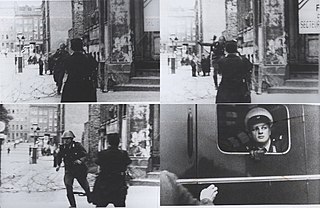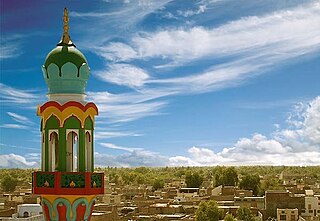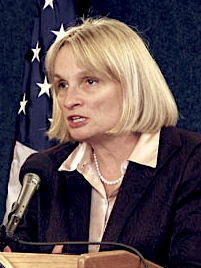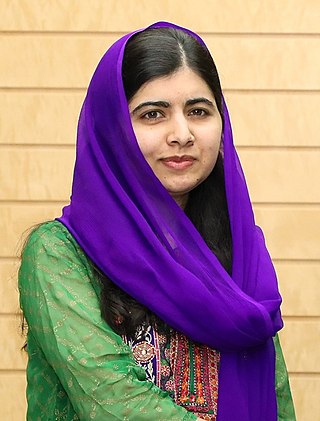The Office of the United Nations High Commissioner for Refugees (UNHCR) is a United Nations agency mandated to aid and protect refugees, forcibly displaced communities, and stateless people, and to assist in their voluntary repatriation, local integration or resettlement to a third country. It is headquartered in Geneva, Switzerland, with over 18,879 staff working in 138 countries as of 2020.

A refugee, conventionally speaking, is a person who has lost the protection of their country of origin and who cannot or is unwilling to return there due to well-founded fear of persecution. Such a person may be called an asylum seeker until granted refugee status by the contracting state or the United Nations High Commissioner for Refugees (UNHCR) if they formally make a claim for asylum.

Layyah District, is a district in the Punjab, Pakistan. It is located in the southern part of the province. Layyah is the district headquarter of Layyah District. Layyah has hot desert climate.

Afghan refugees are citizens of Afghanistan who were forced to flee from their country as a result of wars, persecution, torture or genocide. The 1978 Saur Revolution, followed by the 1979 Soviet invasion, marked the first major wave of internal displacement and international migration to neighboring Iran and Pakistan; smaller numbers also went to India or to countries of the former Soviet Union. Between 1979 and 1992, more than 20% of Afghanistan's population fled the country as refugees. Following the Soviet withdrawal in 1989, many returned to Afghanistan, however many Afghans were again forced to flee during the civil war in the 90s. Over 6 million Afghan refugees were residing in Iran and Pakistan by 2000. Most refugees returned to Afghanistan following the 2001 United States invasion and overthrow of the Taliban regime. Between 2002 and 2012, 5.7 million refugees returned to Afghanistan, increasing the country's population by 25%.

The Mianwali District is a district located in the Mianwali division of the Punjab province of Pakistan.

The Punjab Colleges is a group of colleges active in Punjab, Pakistan.

Wendy Jean Chamberlin is a veteran diplomat who has served in the United States Department of State and USAID, worked for the UN High Commissioner on Refugees (UNHCR), and served as President of the Middle East Institute until 2018.

Sakena Yacoobi is an Afghani activist known for her work for promoting access to education for women and children. She is the founder and executive director of the women-led NGO Afghan Institute of Learning. For her work, Yacoobi has received international recognition, including the 2013 Opus Prize, the 2015 WISE Prize, the 2016 Harold W. McGraw Prize in Education, and an honorary degree from Princeton University.
Kot Chandna, Mianwali, Punjab, Pakistan (Urdu: میانوالی، پنجاب، پاکستان ،كوٹ چاندنہ) is a small town and union council of Mianwali District in the Punjab province of Pakistan. It is part of Isakhel Tehsil and is located at 32°56'27N 71°30'13E at an altitude of 191 metres
Tajiks in Pakistan are residents of Pakistan who are of Tajik ancestry. The Tajiks are a Persian-speaking Iranian ethnic group native to Central Asia, living primarily in Afghanistan, Tajikistan, and Uzbekistan.
Afghans in Pakistan are temporary residents from Afghanistan who are registered in Pakistan as refugees and asylum seekers. They fall under the jurisdiction of the United Nations High Commissioner for Refugees (UNHCR). Most of them were born and raised in Pakistan during the last four decades. Additionally, there are also Special Immigrant Visa applicants awaiting to immmigrate to the United States.

Malala Yousafzai is a Pakistani female education activist and the 2014 Nobel Peace Prize laureate at the age of 17. She is youngest Nobel Prize laureate in history, the second Pakistani and the only Pashtun to receive a Nobel Prize. Yousafzai is a human rights advocate for the education of women and children in her native homeland, Swat, where the Pakistani Taliban had at times banned girls from attending school. Her advocacy has grown into an international movement, and according to former Prime Minister Shahid Khaqan Abbasi, she has become Pakistan's "most prominent citizen."

The head office of UNHCR's mission in India is located in Delhi, with a field office in Chennai. The current Chief of Mission is Areti Sianni. UNHCR won the Indira Gandhi Prize for Peace, Disarmament and Development in 2015. UNHCR was awarded the Mother Teresa Award for Social Justice by the Harmony Foundation, Mumbai.
Malala Fund is an international, non-profit organization that advocates for girls' education. It was co-founded by Malala Yousafzai, the Pakistani activist for female education and the youngest Nobel Prize laureate, and her father, Ziauddin. The stated goal of the organization is to ensure 12 years of free, safe and quality education for every girl. As of July 2020, the organization has 48 staff and supports 58 advocates working across Afghanistan, Brazil, Ethiopia, India, Lebanon, Nigeria, Pakistan and Turkey.
Bani Afghan is a village located in Mianwali District of Punjab Province in Kala Bagh in Pakistan. The village contains an elementary school. The Village Resident are mostly Pashtun tribe that have come from different areas that includes kutch tander khel ,borh khoi ,asghari, kayaki, kani and jamrah. The Area is approximately 3 to 4 KM from CPEC and masan railway station. It is gateway to District Attock. Furthermore, it also connects to Chakrala and Bin Hafiz G.
Saleema Rehman is an Afghan refugee medical doctor living in Pakistan. She is the first female Afghan Turkmen physician.
Zannah Bukar Mustapha is a Nigerian educator and lawyer. He quit the legal profession in 2007 to open a school for orphaned children, opening a second school in 2016. Mustapha has twice negotiated the release of girls and women abducted in north Nigeria. He is the 2017 winner of the Nansen Refugee Award.
The 20-year-long War in Afghanistan had a number of significant impacts on Afghan society.










